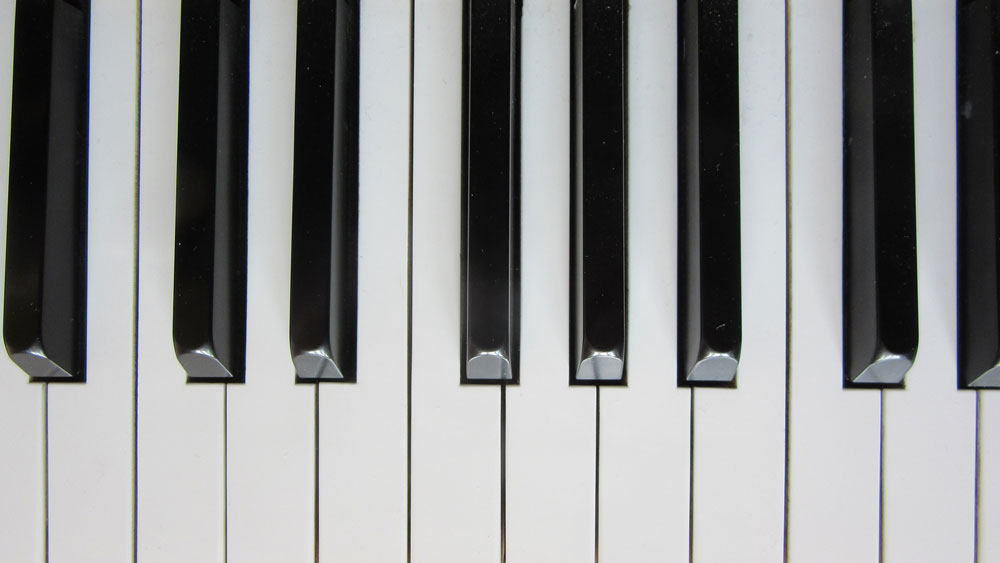
“Should I Buy a Piano or Keyboard?”
As a new pianist, you may be wondering whether you should purchase a piano or keyboard. You can certainly learn on either, as the keys and notes are same! However, there are significant difference that you may not be aware of as a new player. There are also many options for types of pianos or keyboards.
The Basics
What is the difference between a piano and a keyboard? What are the different types of each instrument?
Acoustic Piano
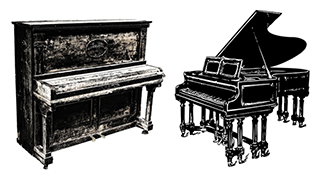
Did you know there are two types of pianos – grand pianos and vertical pianos? Within each type, there are several different kinds, defined by size and construction.
As a new player, if you do not already own one, a grand piano is probably a bit extravagant. However, any one of the four types of vertical pianos – spinet, console, studio, upright – could all be reasonable options.
Keyboard
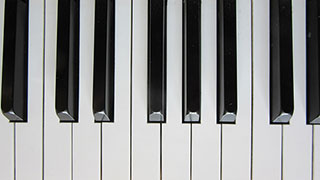
A “keyboard instrument” by definition includes the acoustic piano – because refers to the line of black and white keys. However, when most people use this word, it implies the instrument is electronic. Options can include organs, synthesizers, and digital pianos. Within each category there are many features to consider, as each is quite different from one another. If you already own one, they all would work just fine to learn to play. However, you may find that the sound, feel, or features do not suit your needs over time.
Points to Consider
1. Cost to Buy (or Rent!) the Instrument
In addition to the cost of lessons, there is the expense of the instrument. Understanding the prices associated with each option is a great place to start, as you likely have a budget to keep.
Acoustic Piano
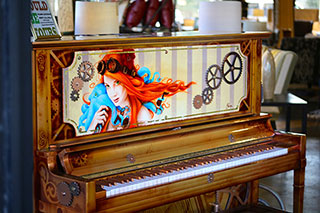
A decent entry-level, used vertical piano can be purchased for under $1,000. A new Steinway grand piano could cost upwards of $100,000. In between, there are infinite options! Factors influencing the price will be the type of piano, the brand or manufacturer, the condition of the piano, and even cosmetic qualities such as the style or finish. Not all of these actual ly influence the sound quality or integrity of the piano, so you may need to shop around a bit to understand the price of the piano you like.
You may also consider renting. Many piano shops will rent pianos whether low or high-quality. You can even rent a grand piano! Again, rental rates will be affected by the same factors as mentioned above for purchasing a piano.
Keyboard
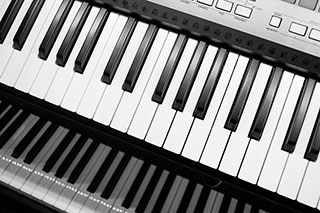
There are numerous options for electronic keyboards within the categories of organ, synthesizer and digital piano. Features, brand and size (the number of keys) typically dictate the price. Here are some of the features and styles that will be most important in making your decision:
- Unweighted vs. weighted keys or action,
- MIDI and Workstation functions
- Console-style digital pianos
I will review these features in detail later in this article. Depending on features and type of keyboard, the price of an instrument could range from $100 to $3,000.
However, I will not cover organs or synthesizers. If you already have one, they will suffice for learning . However, I do not recommend a new student purchase either of these because there are so many better options available.
2. Cost to Maintain the Instrument
In addition to the cost to obtain the instrument, the instrument may require maintenance for upkeep. It may also need repair from normal wear and tear or breakage.
Maintaining a Piano
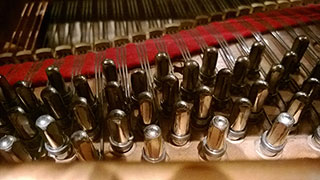
An acoustic piano will need to be tuned. On average, a tuning costs between $75 and $100. The general recommendation is to tune the piano twice a year, assuming it is needed. Changes in humidity and temperature or frequent use may require the piano be tuned every three or four months. Tuning is not only important for sound quality, but maintaining integrity of the instrument. The piano should be kept in tune to prevent structural damage that could cause the piano to lose the ability to maintain its pitch.
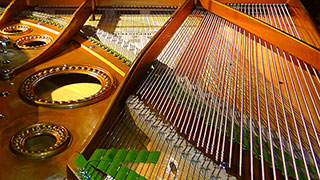
In addition to tuning costs, the piano may occasionally need repairs or maintenance. Before buying or renting, be sure you understand the maintenance costs for the particular piano you are interested in.
If you plan to move soon or frequently, you may also want to consider the cost of moving a piano. Movers need a special lift and the cost to move a small piano across town will be at least $100.
Keyboard Maintenance
Unless you break a key or a button falls off, there are typically no maintenance costs with a keyboard! An electronic keyboard does not need tuning so as long as you follow the manufacturer’s care instructions, it should serve you well for many years.
In the case of breakage, if you are savvy and can keep track of screws, you may be able to repair the keyboard yourself. Otherwise, you will need to rely on a warranty or take your keyboard to a repair shop.
3. Action – How it “Plays”
Part of learning to play the piano is feeling the weight and resistance of the keys. This is necessary to build the strength and technique necessary to play a piano expressively. You can get this experience with either a piano or a keyboard, depending on the type of keyboard you choose.
Piano
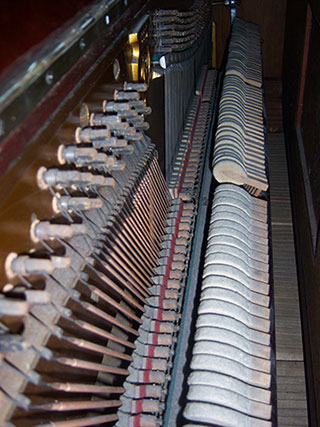
As all cars “drive” a bit differently from one another, the same is true for pianos and how they “play.” Some pianos require a gentle touch while others require great force and motion from the rest of the body.
Any piano will be acceptable for learning. The more pianos you play over your lifetime, the less the variation will matter. Playing a variety of pianos will ultimately improve your skill.
Keyboard Feel – Weighted vs Unweighted
As mentioned in the “cost” section, features are a major influence on the price of a keyboard. The keys on a weighted keyboard simulate the keys on a piano, whereas unweighted keyboards do not. Unweighted keyboards are typically less expensive, unless there are other features driving up the price.
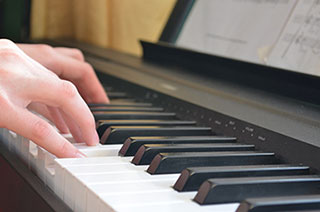
A weighted keyboard is preferred for learning as it is 1) usually more satisfying for the pianist to play and 2) since it simulates the action of a piano the student will be able to work on strength and technique. In some ways, an unweighted keyboard is more difficult to play because it is just not as responsive and fluid as a weighted keyboard. All weighted keyboards feel a bit different, so make sure to try several different brands and models before making a decision to buy.
Still, if and unweighted keyboard is the only option, it will work for learning to read music. However, you may want to consider an upgrade to a weighted keyboard in the future. If cost is a concern, start with a cheaper unweighted keyboard that is still pleasing to the ear, and upgrade after you’ve gotten into your lessons a bit.
4. Creation of Sound
The quality of the sound from your piano or keyboard will impact the enjoyment you receive from playing the instrument. You should understand how a piano creates sound and how a keyboard can recreate these sounds, so you can find an instrument that suits your taste.
Acoustic Qualities of a Piano
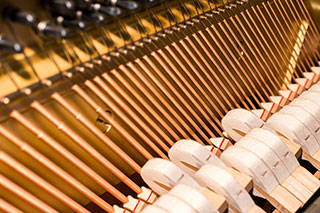
A well-tuned, high quality piano offers the most satisfying experience to the pianist. The acoustic qualities from actual hammers striking actual strings cannot be beat. As a student, I actually preferred an out of tune piano to a keyboard with recordings of a Steinway because I loved the organic sound of a piano. I don’t necessarily feel the same way today, as my ear has developed greater sensitivity to pitch over the years. However, if there is a piano in your budget that is pleasing to your ear and you can keep it in tune – this is the best option!
Keyboard Sound – Touch Sensitive or Not?
Just as a weighted keyboard mimics the action of a piano, a touch-sensitive keyboard mimics the sound of a piano. A keyboard without the touch sensitive function will play notes at the same volume, regardless of how hard you press or strike the key. In contrast, a touch-sensitive keyboard will play at multiple volumes. A lower end touch-sensitive keyboard may only have a few volume levels so you may be able to perceive the difference. The more touch-sensitive the keyboard, the more expressively you can play.
Keyboards will vary in the tonal quality they provide, as well. The piano sounds, or patches, in some keyboards were actually recorded from high quality pianos such as a Steinway grand. If you are not enchanted by the organic nature of sound creation, you may prefer the tonal perfection in these recorded sounds. If so, you should consider a mid to high-quality keyboard. With a keyboard, you’ll always know the “piano” is in tune.
5. Additional Features
What are your long term goals with the piano and music? Do you want to play only classical music and someday perform in Carnegie Hall? Do you want to write your own songs?
A Piano is a Piano
An acoustic piano typically does not have any other functions, perhaps aside from an antique player piano! If you love the piano because you love the piano itself, investing in a high quality piano may be the right choice.
Keyboard MIDI – a tool for songwriting, learning, and more!
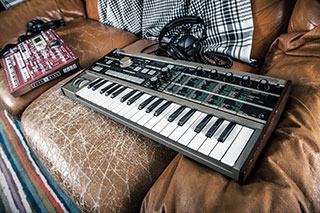
The MIDI function allows your keyboard to connect to your computer. The keyboard sends and receives data which can be used to record what you’re playing, create sheet music, and a variety of other tasks depending on the software you use. This feature is useful for those who want to write and record their own music. It can also be a helpful learning tool. As you play, the computer software can display the notes in real time – reinforcing note recognition to improving your reading. There are various free and paid software programs that you can use with MIDI, depending on the purpose and complexity of your task or project.
Workstations are another option, though the only purpose would be for writing and recording songs. Using a workstation eliminates the need for computer software, as all work is completed on the keyboard – the computer is in the keyboard itself. However, workstations can be a bit cumbersome and have a learning curve of their own.
6. Other Purposes for the Instrument
Do you love the look of a beautiful piano in a home? Or are you more focused on getting out and playing in public? Where you want to play the instrument should be a consideration if you can only afford one instrument.
The Beauty of a Piano
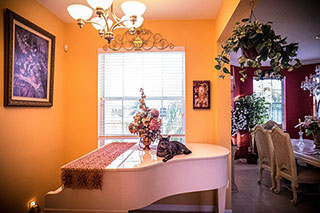
Some people own a piano without actually knowing how to play it – they see it as a beautiful piece of furniture. As a pianist, of course I think they should learn to play it, but it is another point to consider. A piano can certainly add beauty and a heightened sense of stature to your home. A piano is also an investment, so it may also be seen as a family heirloom. Many pianists have been inspired to learn how to play the mysterious, massive instrument as is prominent in the home and so easily invites musical experimentation! Buying a piano as a family heirloom could inspire future generations of your family to become musicians.
Keyboards – Portable or Not!
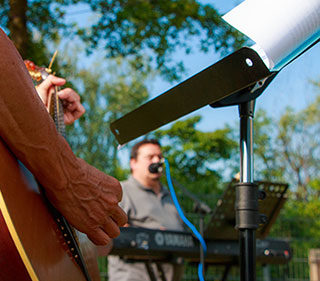
One great aspect of an electronic keyboard is the portability. As long as there is electricity, you can play it anywhere! This is important for people who want to start a band or perform at open mic nights and jams. You can’t take a piano with you and there most likely will not be a piano where you are playing. If portability is important to you, be sure you understand whether or not the the keyboard has its own speakers or will need external amplification or speakers.
There are also some non-portable electronic keyboards that can also serve the purpose of a lovely furniture piece – digital console pianos. They are not as stately as an acoustic piano, however digital consoles have a nicer presence in the home than a portable keyboard on a folding stand.
Focus on Enjoyment
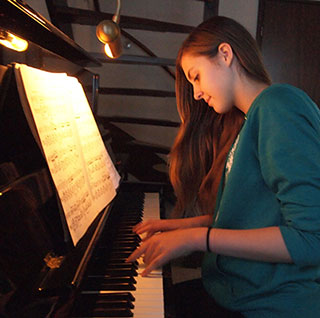
While making your decision between an acoustic piano and a electronic keyboard or digital piano, focus on how much you enjoy playing the instrument. If you do not enjoy playing the instrument or enjoy the sound, you will not be engaged in lessons. Regardless of your purchasing (or rental!) decision, set a budget and buy the best you can afford based on the points above.
Please note that if you are considering taking lessons with me, we can discuss what option might be best for you and your needs. I want you to enjoy playing the piano as much as possible!
Related Articles Recommended for You

Read More

Read More

Read More

Read More

Read More

Read More

Read More

Read More

Read More

Read More
Schedule Your First Lesson!
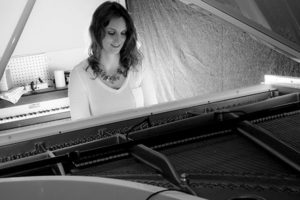 Contact Me
Contact Me
today
to schedule
your or your child’s
first piano lesson!